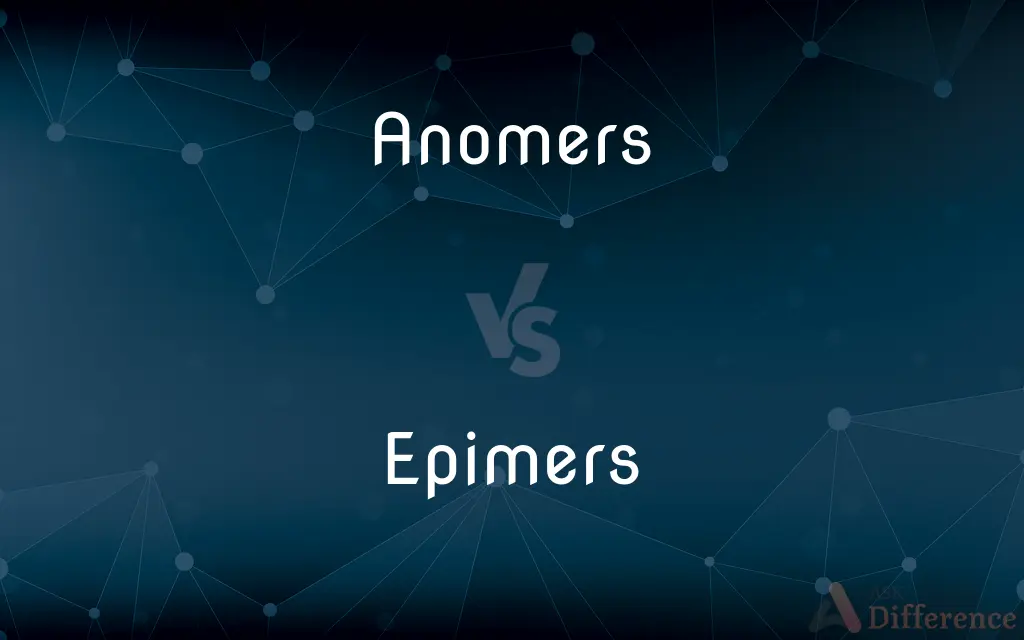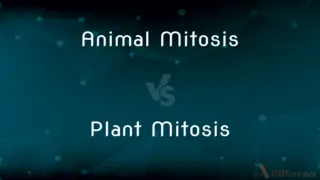Anomers vs. Epimers — What's the Difference?
By Tayyaba Rehman — Published on December 27, 2023
Anomers are cyclic sugar isomers differing at the new chiral center formed on ring closure; Epimers are sugar isomers differing at any chiral center except the anomeric.

Difference Between Anomers and Epimers
Table of Contents
ADVERTISEMENT
Key Differences
Anomers are specific types of stereoisomers of cyclic sugars that differ in configuration at the anomeric carbon, which is the carbon where the sugar forms its cyclic structure. Epimers, on the other hand, are stereoisomers that differ in configuration at any chiral center, other than the anomeric carbon, in a sugar molecule.
Anomeric carbon is newly formed when a sugar molecule transitions from its straight-chain form to its cyclic form. Anomers arise due to the different possible orientations the hydroxyl group can take at this anomeric carbon. Epimers don't necessarily relate to the cyclic form but are more general, reflecting a difference at any other chiral center in the sugar molecule.
In the context of glucose, α-glucose and β-glucose are Anomers of each other because they differ at the anomeric carbon. On the contrary, glucose and mannose are Epimers, differing in configuration at carbon-2, which is not the anomeric carbon.
Anomers have a unique property called mutarotation, where they can interconvert in an aqueous solution, leading to an equilibrium mixture of both forms. Epimers do not have this property. They remain distinct and do not interconvert under normal conditions.
The study of Anomers and Epimers is crucial in biochemistry and organic chemistry. Understanding these isomers aids in comprehending carbohydrate metabolism, enzymatic reactions, and the structural diversity of sugars.
ADVERTISEMENT
Comparison Chart
Definition
Isomers differing at the anomeric carbon.
Isomers differing at any chiral center except the anomeric.
Example
α-glucose and β-glucose
Glucose and mannose
Property
Exhibit mutarotation in aqueous solutions.
Do not exhibit mutarotation.
Occurrence
Arise due to cyclic structure formation.
Can be present in cyclic and acyclic sugars.
Relevance
Influences cyclic sugar conformation.
Determines sugar type and function.
Compare with Definitions
Anomers
Anomers can interconvert in a phenomenon known as mutarotation.
Over time, a solution of α-glucose will become a mix of α and β forms.
Epimers
Epimers are a broader category of isomers than Anomers, not limited to the anomeric carbon.
Glucose and galactose differ at C-4, making them Epimers.
Anomers
Anomers arise when sugars cyclize, creating a new chiral center at the site of cyclization.
In solution, glucose exists as a mix of its α and β Anomers.
Epimers
Epimers are sugars differing in configuration at one specific chiral carbon.
Glucose and mannose are Epimers.
Anomers
Anomers are cyclic sugar isomers that differ at the anomeric carbon.
α-D-glucopyranose and β-D-glucopyranose are Anomers.
Epimers
Epimers do not interconvert under normal conditions.
Glucose remains distinct from mannose; they don't change into each other.
Anomers
Anomers determine the orientation of the hydroxyl group at the anomeric center.
In α-anomers, the hydroxyl is axial, while in β, it's equatorial.
Epimers
Epimers can include differences at any chiral center in a sugar except the anomeric carbon.
Ribose and arabinose are Epimers at carbon-2.
Anomers
Anomers are a subset of epimers, specific to the anomeric carbon.
The α and β forms of fructose are also Anomers.
Epimers
Epimers play critical roles in biological systems due to their structural variations.
The different effects of glucose and galactose in the body arise from their epimeric difference.
Anomers
Plural of anomer
Epimers
Plural of epimer
Common Curiosities
What are Anomers?
Anomers are cyclic sugar isomers differing at the new chiral center formed upon ring closure.
Can Epimers mutarotate?
No, Epimers don't undergo mutarotation like Anomers.
Do Anomers interconvert?
Yes, Anomers can interconvert through a process called mutarotation.
Are glucose and galactose Anomers or Epimers?
Glucose and galactose are Epimers.
Which has a broader definition, Anomers or Epimers?
Epimers have a broader definition, encompassing more isomeric possibilities.
Why are Epimers important in biology?
Epimers can have different properties and functions, making them vital in biological pathways and metabolism.
What are Epimers?
Epimers are sugar isomers differing in configuration at any chiral center, excluding the anomeric carbon.
Which carbon is involved in Anomers' differentiation?
Anomers differ at the anomeric carbon.
At which carbon do Epimers differ?
Epimers differ at any chiral carbon other than the anomeric one.
Is every Epimer also an Anomer?
No, while all Anomers are Epimers, not all Epimers are Anomers.
What causes the formation of Anomers?
Anomers form when sugars cyclize, creating a new chiral center (anomeric carbon).
Can Anomers be easily separated?
Anomers can interconvert in solution, making their separation challenging.
Do Epimers have different physical properties?
Yes, Epimers can have distinct physical and chemical properties due to their structural differences.
How are Anomers named?
Anomers are typically named α or β based on the orientation of the hydroxyl group at the anomeric carbon.
Which is more specific in terms of location, Anomers or Epimers?
Anomers are more specific as they only involve the anomeric carbon.
Share Your Discovery

Previous Comparison
Windows 7 Professional vs. Windows 7 Ultimate
Next Comparison
Animal Mitosis vs. Plant MitosisAuthor Spotlight
Written by
Tayyaba RehmanTayyaba Rehman is a distinguished writer, currently serving as a primary contributor to askdifference.com. As a researcher in semantics and etymology, Tayyaba's passion for the complexity of languages and their distinctions has found a perfect home on the platform. Tayyaba delves into the intricacies of language, distinguishing between commonly confused words and phrases, thereby providing clarity for readers worldwide.











































